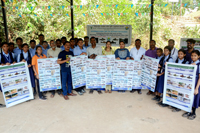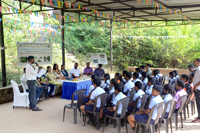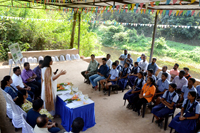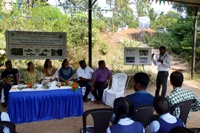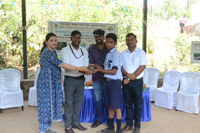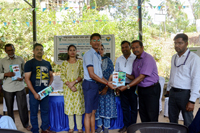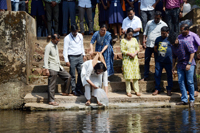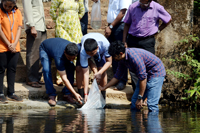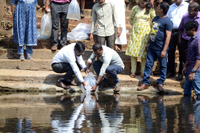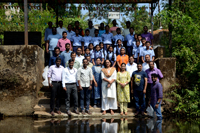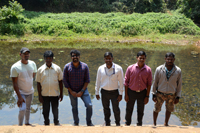
ICAR-CCARI organized a field day cum indigenous fish ranching in Valvanti River, Goa on International Day of Action for Rivers.
ICAR-CCARI organized a field day cum indigenous fish ranching in Valvanti River, Goa on International Day of Action for Rivers.
To highlight the significance of the conservation of Small indigenous fishes (SIFs) and their habitats for the sustainable future of riverine ecosystems, ICAR-CCARI organized a field day and ranching of Indigenous Fish Stocks in Valvanti River at Keri, Sattari, Goa on the occasion of International Day of Action for Rivers on 14th March, 2024. The International Day of Action for Rivers is celebrated annually to emphasize the importance of the river as a life-support system. Rivers are essential components of ecosystems, maintaining diverse aquatic habitats, supporting a myriad of species ranging from fish to amphibians, and providing crucial breeding and feeding grounds for their survival. Due to urbanization, ornamental trade, overfishing, and pollution, the indigenous fish stocks from rivers face a drastic decline, especially along the Western Ghats region. Small Indigenous Fishes (SIF) occupy a critical link in the life, livelihood, health, and general well-being of rural populations. To augment riverine fish stock, about 1000 individuals of hatchery-produced seeds of seven indigenous fish species from ICAR-CCARI were released. The event garnered 40 participants from a diverse array of stakeholders, including fishermen, students, local residents, fisheries department officials, and representatives from the Keri Sattari Grampanchayat.
During the event, Dr. Shamila Monteiro, Director of Fisheries and Member Secretary, Goa State Pollution Control Board, highlighted the importance of conserving rivers to sustain fish diversity in the Western Ghats region. She also inspired young minds by explaining the scope of the fisheries sector and the opportunities that await them. Shri Trivesh Suresh Mayekar, Scientist (Fish Genetics and Breeding) emphasized the importance of conserving rivers, small indigenous fishes, and their role in providing food and nutritional security to the rural population. He also mentioned that the institute would like to enhance the stocks of indigenous fishes by breeding them in captivity, thereby completely eradicating the need for wild catch for the ornamental fish trade. Dr. Sreekanth G.B., Sr. Scientist (Fisheries Resource Management) expressed sincere gratitude towards all the stakeholders who participated in the event. He highlighted the need to conserve the indigenous fishes of the Western Ghats and emphasized their ecological significance.
Mrs. Diksha Gawas, Sarpanch of Keri Sattari village, highlighted the need for conservation of water and thanked ICAR for conducting this event to spread awareness. Shri Nanda Majik, BMC chairperson, expressed the need for river conservation efforts. Shri Gopinath Gawas, School headmaster, mentioned the efforts taken by villagers to clean river Valvanti during the past years. During the programme, a small aqua-quiz competition was also conducted for the students, and fish bowls were distributed to the winners. Extension folders and fish posters displaying the fishes of Goa were also distributed to school students to make them aware of the fish diversity of Goa. The fish posters were also given in the Keri Sattari Grampanchayath office to create awareness for the local residents on fish conservation in Goa. Shri Trivesh Mayekar, Dr. Sreekanth GB (Scientist, ICAR-CCARI), Mr. Borges BB (Project assistant ICAR-CCARI), and Mr. Melbin Lal (Young Professional ICAR-CCARI) coordinated the programme.
